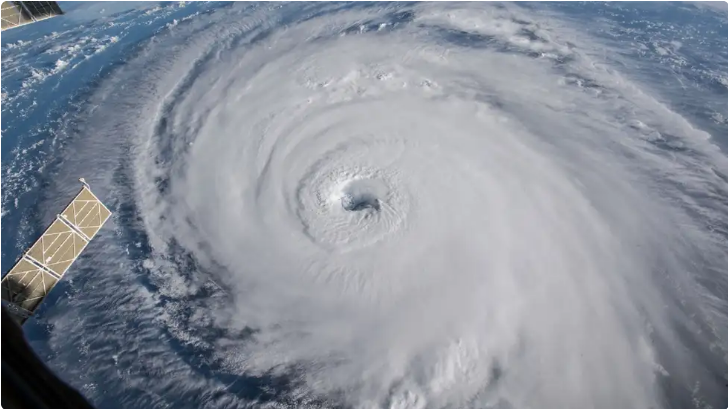Thunderstorms Cyclone Causes - Effects of Hurricanes
In this article we will be studying about cyclone, what is a cyclone, cyclone meaning, cyclone definition, causes of cyclone, effects of cyclone, what is storm, precautions of cyclone and define thunderstorm.
This Story also Contains
- What is a cyclone?
- Cyclone Information/Explain Cyclone
- Causes of Cyclone/ How does cyclone occurs?/What causes a Cyclone[Causes of Tropical Cyclone]?
- Thunderstorm
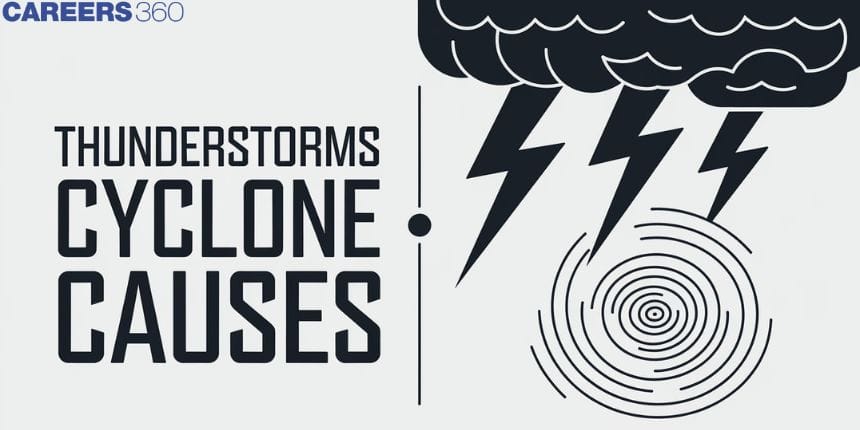
Introduction of Cyclone
The term Cyclone is derived from the Greek word Cyclos which means the coils of a snake.
What is a cyclone?
A cyclone is a low pressure area where the winds spiral inwards. Cyclone rotates in counter clockwise direction in Northern Hemisphere. It is clockwise in Southern Hemisphere. The other names for cyclones are Typhoon and Hurricane.
Also read -
Cyclone Information/Explain Cyclone
What is the meaning of cyclone?
Cyclone meaning in English is depression.[ About Cyclone in English]
Cyclone meaning in Telugu is తీవ్రమైన గాలి తుఫాను
Cyclone meaning in Gujarati is ચક્રવાત(Cakravāta)
Cyclone definition[Tropical Cyclone Definition]/Cyclone meaning:
In meteorology, a cyclone is tropical system in which the atmospheric winds rotate inwards to a low-pressure area at the centre. It can be clockwise and anticlockwise depending upon the Southern and Northern Hemisphere.
Cyclone Diagram[Diagram tropical cyclone]
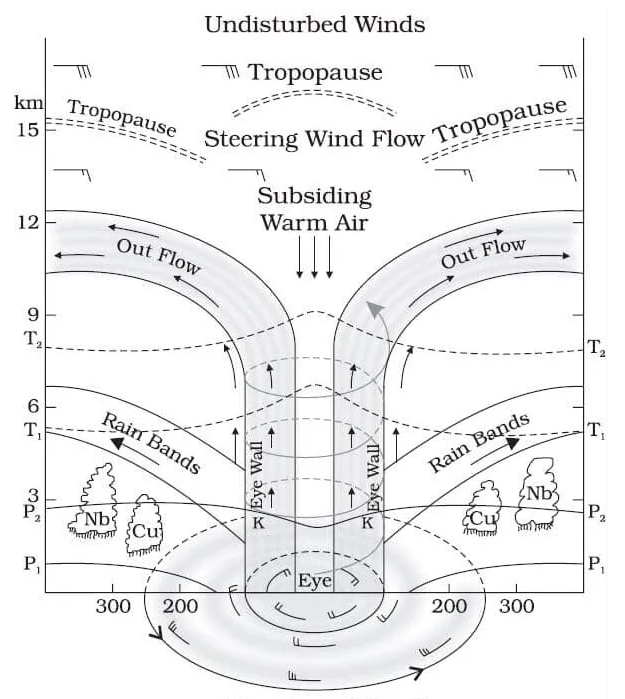
Causes of Cyclone/ How does cyclone occurs?/What causes a Cyclone[Causes of Tropical Cyclone]?
The causes of cyclone are as follows:-
The below mentioned points will also give the answer to the question why cyclone occurs? The causes of cyclone in points are:-
- Cyclone is caused at low pressure areas.
- Cyclone occurs at the equator.
- Cyclone is caused by the rising of warm air above the surface of sea.
- When the warm air rises, the cold air rushes to the empty space.
- Then the cold air gets heated up and again rises in the atmosphere.
- This process (Cyclone Cycle) takes place continuously.
- This process of rapid rising of hot air creates an eye at the centre of the cyclone.
- Similarly, the low pressure area gets filled by the high pressure winds.
Hence, this is how cyclone occurs. The above mentioned points explain the causes of Cyclone.
Formation of cyclone Diagram
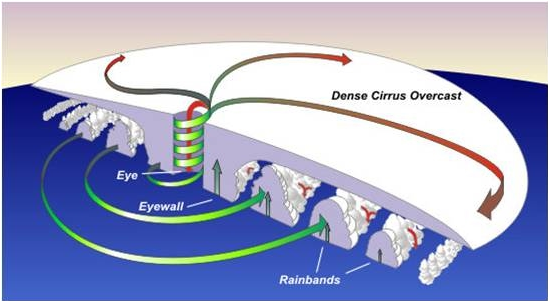
Effects of Cyclone
Or
Impact of cyclone/Consequences of Cyclone
The effects of cyclone can be devastating.
Here are the effects of cyclone in points
- Cyclone can cause damage to lives
- Cyclone can cause damage to property.
- Cyclone can be responsible for flash flood which is accompanied by heavy rainfall.
Also, effects of cyclone on human life can be destructive.
Precautions of Cyclone
Here is the list of 5 precautions of cyclone that is needed to be taken.
- Ensure that the house is in good condition before the cyclone.
- Keep all the required materials like food, water, batteries, candles, etc prepared in advance of the cyclone.
- During the cyclone, stay inside the house and secure the doors and windows.
- At the time of cyclone, to avoid short circuiting, turn off all the electrical appliances. Also turn off the gas.
- Take all the cyclone related warnings seriously. Stay updated with the latest cyclone news and weather forecasting.
These are the precautions of cyclone class 7
Q. How long does a cyclone last?
ANS. An average cyclone life is 9 days.
Related Topics Link, |
Where is cyclone?
It is called-
- In Eastern Pacific and Atlantic – hurricane
- In Southeast Asia- typhoon
- In Western Pacific (around Australia) and in the Indian ocean- cyclone.
Parts of Cyclone
There are 3 parts of cyclone
- The eye [The eye is the centre of the cyclone]
- The eyewall
- Rainband
NOTE: There are 5 categories of cyclone among which Category 5 cyclone is the most destructive one
We can put all the information that we have studied in the cyclone ppt/ cyclone slideshare. And it is a more convenient and interactive way to learn.
Cyclone Movement
The winds (or the Cyclonic winds) travel at all places except for the equatorial belt.
Also read : NCERT Solutions for Class 8 Science Chapter 15 Some Natural Phenomena
What is storm?
A storm is a powerful atmospheric disturbance. Storms are common event that occur on Earth. Storms also occur on other planets, too.
Causes of Storm/ How are storms formed?
What causes storms? Storms are created when a low pressure system develops at the centre and the high pressure system surrounds it. The opposing forces creates winds, eventually causing the Storm.
EXAMPLES OF CYCLONE-
Atlantic hurricane. Pacific hurricane. Pacific typhoon.
Types of storms
Types of storms are as follows:-
- Thunderstorms
- Tornadoes
- Hurricanes
Effects of Storms
The effects of storms are:-
- Strong winds
- High rainfall
- Storm
- Buildings and bridges can be destroyed
- Roads, railways, power cables & telephone lines can become damaged.
- Water and sewage supplies are affected.
NCERT Physics Notes:
Thunderstorm
Thunderstorm meaning in Telugu is తుఫాను (Tuphānu)
Thunderstorm meaning in Gujarati is વાવાઝોડું(Vāvājhōḍuṁ)
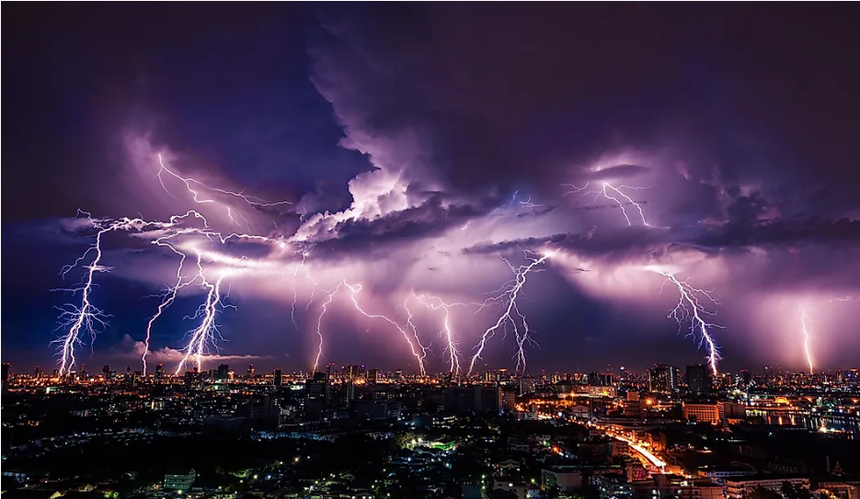
Define Thunderstorm.
Thunderstorm definition: It means a storm with thunder and lightning and it is also accompanied by heavy rainfall.
What causes Thunderstorms?
Thunderstorms require 3 main ingredients: moisture, unstable air and lift.
Effects of Thunderstorms
- Heavy rains
- Strong winds
- Lightning, and tornadoes
- Damage to homes and property
Hurricane
Hurricane meaning in telugu is చండమారుతము
Hurricane meaning in gujarati is વાવાઝોડું(Vāvājhōḍuṁ)
Effects of Hurricanes- Same as cyclone
Also check-
Frequently Asked Questions (FAQs)
Cyclone is tropical system in which the atmospheric winds rotate inwards to a low-pressure area at the centre.
Cause- The process of rapid rising of hot air at the centre.
Effect- loss of lives & properties.
Cyclone is tropical system in which the atmospheric winds rotate inwards to a low-pressure area at the centre.
Cyclone is caused by the process of rapid rising of hot air at the centre.
Cyclone is tropical system in which the atmospheric winds rotate inwards to a low-pressure area at the centre.
Whereas A storm is a powerful atmospheric disturbance. Storms are common event that occur on Earth. Storms also occur on other planets,too.
Cause- The process of rapid rising of hot air at the centre.
Effect- loss of lives & properties
Cyclone is tropical system in which the atmospheric winds rotate inwards to a low-pressure area at the centre. Whereas thunderstorm is a storm with thunder and lightning and it is also accompanied by heavy rainfall.
When water vapour changes its state back to liquid form (raindrops), it releases heat to the atmosphere. This heat warms the air around. The heated air tends to rise. Hence, we see a drop in pressure. As a result more air rushes to the centre of the storm. Consequently, forming the cyclone.
